Coffee Alternatives And Tea
What Is a Good Substitute for Using Cream in Coffee That Tastes the Same

As someone who adores coffee, I understand how challenging it can be to locate an alternative to cream that maintains the flavor integrity. Fortunately, my research efforts have uncovered numerous alternatives that provide that desirable creamy texture without involving any dairy products.
In this article, we’ll explore a range of dairy-free alternatives, from plant-based milk options to non-dairy creamers and whipped toppings.
Get ready to enhance your coffee experience with expert tips and unique flavor infusions that will leave your taste buds satisfied.
Key Takeaways
- Dairy-free alternatives such as almond milk, oat milk, coconut milk, and soy milk can be used as substitutes for cream in coffee.
- Plant-based milk options like almond milk, coconut milk, oat milk, and soy milk offer different flavors and nutritional benefits.
- Natural sweeteners like honey, maple syrup, and homemade coffee syrups can enhance the flavor of coffee without using cream.
- Non-dairy creamers and plant-based cream alternatives provide a creamy texture and taste, with various flavor options available.
Dairy-Free Alternatives
If you’re looking for a dairy-free alternative that tastes just as good, try using almond milk or oat milk instead of cream in your coffee. These plant-based creamers are not only delicious, but they also offer a healthier option for those who are lactose intolerant or following a vegan diet.
Almond milk is made from ground almonds and water, providing a creamy texture and a slightly nutty flavor. Oat milk, on the other hand, is made from soaked oats and water, resulting in a smooth and slightly sweet taste.
Both alternatives can be easily made at home by blending the ingredients together and straining out any remaining solids. So next time you reach for the creamer, consider trying these homemade alternatives for a dairy-free and tasty coffee experience.
Plant-Based Milk Options
There are several plant-based milk options available that provide a similar taste in coffee. These alternatives not only cater to those with dietary restrictions or preferences, but also offer a range of benefits. Here are some plant-based milk options worth considering:
-
Almond milk: Made from ground almonds and water, almond milk has a subtle nutty flavor that pairs well with coffee. It is low in calories and contains vitamin E, calcium, and healthy fats.
-
Coconut milk: Derived from the white flesh of coconuts, coconut milk adds a creamy texture and a hint of tropical flavor to your coffee. It is rich in medium-chain triglycerides (MCTs), which can provide a quick source of energy.
-
Oat milk: Made from soaked oats blended with water, oat milk has a creamy consistency and a mild, slightly sweet taste. It is high in fiber and can help lower cholesterol levels.
-
Soy milk: Soy milk is made from soybeans and water, offering a creamy texture and a mild, nutty flavor. It is a good source of protein and contains essential amino acids.
In addition to these options, you can also experiment with making your own homemade coffee creamer using plant-based milks. This allows you to customize the flavor and sweetness to your liking, while avoiding any unwanted additives or preservatives.
With a bit of creativity, you can enjoy a delicious cup of coffee with the benefits of plant-based milk.
Enhancing Flavor With Natural Sweeteners
To enhance the flavor of your coffee, try using natural sweeteners like honey or maple syrup instead of refined sugar. Not only do they add a touch of sweetness, but they also bring unique flavors that can elevate your coffee experience. Homemade coffee syrups are another great option to explore. By infusing your favorite flavors into simple syrup, you can customize your coffee to your liking. Here is a table showcasing some delicious homemade coffee syrups you can easily make at home:
| Flavor | Ingredients | Instructions |
|---|---|---|
| Vanilla | Vanilla extract, sugar | Combine ingredients and heat until sugar dissolves. |
| Caramel | Caramel sauce, sugar | Heat caramel sauce and sugar until fully combined. |
| Hazelnut | Hazelnut extract, sugar | Mix extract and sugar until well blended. |
| Peppermint | Peppermint extract, sugar | Combine extract and sugar, stirring until dissolved. |
| Coconut | Coconut milk, sugar | Heat coconut milk and sugar until sugar dissolves. |
Exploring Non-Dairy Creamers
When it comes to finding a suitable alternative for cream in coffee, plant-based cream alternatives are a great option to consider. Not only do they provide a creamy texture and taste, but they also offer several nutritional benefits.
Non-dairy creamers are often fortified with vitamins and minerals, making them a healthier choice. Additionally, there are numerous flavor options available, ranging from classic vanilla to unique options like hazelnut or caramel, allowing you to customize your coffee experience to your liking.
Plant-Based Cream Alternatives
If you want a cream alternative that tastes the same but doesn’t use dairy, try using plant-based creamers in your coffee. Plant-based creamers are a great option for those looking for dairy alternatives or homemade creamers.
Here are four reasons why plant-based creamers are worth trying:
-
Variety of flavors: Plant-based creamers come in a wide range of flavors, such as vanilla, hazelnut, and caramel, allowing you to customize your coffee to your liking.
-
Creamy texture: These creamers have a smooth and creamy consistency that adds richness to your coffee without the need for dairy.
-
Health benefits: Plant-based creamers are often lower in saturated fat and cholesterol compared to traditional creamers, making them a healthier choice.
-
Ingredient transparency: Many plant-based creamers are made with natural and organic ingredients, giving you peace of mind about what you’re consuming.
By incorporating plant-based creamers into your coffee routine, you can enjoy a delicious and dairy-free alternative that offers a variety of flavors and health benefits.
Now let’s explore the nutritional benefits of non-dairy creamers.
Nutritional Benefits of Non-Dairy Creamers
You’ll be pleased to know that non-dairy creamers offer a variety of nutritional benefits that can enhance your coffee experience.
Non-dairy creamers come in different flavors, such as vanilla and hazelnut, to add a touch of sweetness to your coffee. They are also available in low-fat and sugar-free options, making them a healthier choice for those watching their calorie intake.
Non-dairy creamers are often made from plant-based ingredients like soy, almonds, or coconut, which can provide essential nutrients like calcium, vitamin E, and healthy fats. However, it’s important to note that some non-dairy creamers may contain additives and artificial flavors.
It’s always a good idea to check the ingredient list and choose a non-dairy creamer that aligns with your dietary preferences and health goals.
Overall, non-dairy creamers offer a convenient and tasty alternative to traditional cream, with the added benefit of various nutritional options.
Flavor Options Available
To enhance your coffee experience, try out the various flavor options available in non-dairy creamers. Not only do they provide a creamy and delicious addition to your morning cup of joe, but they also offer a wide range of flavors to suit your taste preferences.
Here are some enticing options to consider:
-
Vanilla: Add a touch of sweetness and a hint of vanilla to your coffee with a vanilla-flavored non-dairy creamer.
-
Hazelnut: Indulge in the rich and nutty flavor of hazelnuts with a hazelnut-flavored non-dairy creamer.
-
Caramel: Enjoy the irresistible sweetness of caramel with a caramel-flavored non-dairy creamer.
-
Peppermint: For a refreshing twist, try a peppermint-flavored non-dairy creamer that adds a cool and minty taste to your coffee.
Don’t limit yourself to plain creamers when you can explore these delicious flavor options. And if you’re feeling adventurous, you can even make your own homemade coffee syrups to personalize your coffee even more.
Adding Nutritional Boosters
Adding nutritional boosters like almond milk or oat milk can provide a creamy texture to your coffee without using cream. These dairy-free alternatives are not only delicious but also offer additional health benefits.
Almond milk, for example, is a great source of dairy-free protein and is rich in essential vitamins and minerals. It also contains healthy fats which can help keep you feeling full and satisfied.
Oat milk, on the other hand, is known for its creamy consistency and is often fortified with calcium and vitamin D.
Both almond milk and oat milk can be easily incorporated into your coffee routine, providing a nutritious and flavorful alternative to traditional cream.
In addition to these milk options, you can also consider adding superfood additions like chia seeds or collagen powder for an extra nutritional boost.
Whipped Toppings as Substitutes
Now that we’ve explored adding nutritional boosters to coffee, let’s dive into the world of whipped toppings as substitutes for cream.
Whipped cream alternatives can be a great option for those who are lactose intolerant or simply want to reduce their dairy intake. Here are some homemade coffee creamers that will surely make your taste buds dance:
-
Coconut Cream: Rich and creamy, coconut cream adds a tropical twist to your coffee.
-
Almond Milk Whipped Cream: Made from blending almond milk with a touch of sweetness, this whipped cream alternative is light and airy.
-
Cashew Cream: Soak cashews overnight, blend them with water, and voila! You have a smooth and velvety coffee creamer.
-
Aquafaba: The liquid leftover from cooking chickpeas, aquafaba can be whipped into a fluffy topping that’s perfect for coffee.
Trying Unique Flavor Infusions
As a coffee enthusiast, I’m always on the lookout for unique and exciting flavor combinations to try in my daily cup of joe. Unusual coffee flavorings can add a whole new dimension to your morning routine, taking your taste buds on a delightful adventure.
From hints of lavender and cardamom to unexpected ingredients like bacon or avocado, there are endless possibilities for creative infusion combinations that will make your coffee experience truly one-of-a-kind.
Unusual Coffee Flavorings
If you’re looking for unique coffee flavorings, there are plenty of options that can add a twist to your morning cup. Here are some unusual coffee additives and creative coffee flavorings that you can try:
-
Vanilla Extract: Just a few drops of vanilla extract can transform your coffee into a sweet and aromatic treat.
-
Cinnamon: Sprinkling some cinnamon into your coffee not only adds a warm and cozy flavor, but also offers potential health benefits.
-
Orange Zest: Grating some orange zest into your coffee can give it a refreshing citrusy taste that pairs well with the rich coffee flavor.
-
Cardamom: This fragrant spice adds a unique and exotic twist to your coffee, creating a delightful and complex flavor profile.
Creative Infusion Combinations
To elevate your daily coffee experience, try experimenting with creative infusion combinations that will awaken your taste buds and add a unique twist to your morning cup.
One way to do this is by making your own homemade coffee creamer. If you’re looking for a dairy-free option, there are plenty of alternatives that can still give your coffee that creamy, indulgent taste. One popular option is using coconut milk or almond milk as a base for your creamer. You can add flavors like vanilla extract, cinnamon, or even a dash of cocoa powder to create a delicious and flavorful creamer.
Another interesting combination to try is infusing your coffee with different herbs and spices, such as cardamom, ginger, or lavender. These combinations not only add depth and complexity to your coffee, but they also provide various health benefits.
Expert Tips for a Creamy Coffee Experience
You can achieve a creamy coffee experience by using alternative milk options such as almond or oat milk. These plant-based coffee creamers are not only delicious but also offer a variety of health benefits.
Here are some expert tips to enhance your coffee with homemade creamer recipes:
-
Almond Milk Creamer: Blend 1 cup of soaked almonds with 2 cups of water until smooth. Strain the mixture through a cheesecloth and store in a jar for up to a week.
-
Oat Milk Creamer: Blend 1 cup of oats with 2 cups of water until creamy. Strain and refrigerate for a creamy and slightly sweet creamer.
-
Coconut Milk Creamer: Mix equal parts coconut milk and water for a rich and creamy addition to your coffee.
-
Cashew Creamer: Soak 1 cup of cashews overnight, then blend with 2 cups of water until smooth. Store in the refrigerator and enjoy the velvety texture in your coffee.
Frequently Asked Questions
Are There Any Specific Health Benefits Associated With Using Dairy-Free Alternatives in Coffee?
There are specific health benefits associated with using dairy-free alternatives in coffee. These alternatives can provide unique flavor infusions and are often lower in calories, fat, and cholesterol compared to traditional cream.
Can You Provide Some Examples of Unique Flavor Infusions That Can Be Used as Substitutes for Cream in Coffee?
Unique flavor infusions for coffee can be a great substitute for cream. They add a burst of flavor without the dairy. Some examples include vanilla extract, cinnamon, and almond milk. These alternatives also offer the added benefits of being dairy-free.
Are There Any Specific Plant-Based Milk Options That Have a Similar Taste and Consistency to Cream?
There are plant-based milk options available that have a similar taste and consistency to cream. These alternatives provide a creamy texture and rich flavor, making them a great substitute for those who prefer a non-dairy option in their coffee.
What Are Some Common Nutritional Boosters That Can Be Added to Coffee as a Substitute for Cream?
There are several specific nutritional boosters that can be added to coffee as a substitute for cream. They can provide benefits such as added protein, healthy fats, and vitamins. Different plant-based milk options also offer a range of tastes and consistencies.
Do Whipped Toppings Provide a Similar Creamy Texture and Taste as Using Cream in Coffee?
Yes, whipped toppings can provide a similar creamy texture and taste as using cream in coffee. However, there are other alternatives like coffee creamers that can also enhance the flavor without compromising on taste.
Conclusion
After exploring various dairy-free alternatives, plant-based milk options, natural sweeteners, non-dairy creamers, nutritional boosters, whipped toppings, and unique flavor infusions, it is clear that there are plenty of delicious substitutes for cream in coffee that taste just as good.
By incorporating these alternatives, you can enjoy a creamy coffee experience without compromising on taste.
So why settle for ordinary when you can indulge in an extraordinary cup of coffee that will transport you to a world of rich, velvety goodness?
Noah, the Editor-in-Chief at Cappuccino Oracle, plays a pivotal role in shaping the voice and vision of our renowned platform. With an unwavering passion for coffee, coffee alternatives, and tea, Noah leads Cappuccino Oracle towards new horizons in the realm of coffee journalism.
Beyond his professional responsibilities, Noah serves as a mentor and guiding force for his team. His dedication to journalistic excellence and genuine love for coffee, coffee alternatives, and tea continue to inspire and motivate the Cappuccino Oracle family. In the ever-evolving world of these beverages, Noah’s leadership ensures that our platform remains at the forefront, delivering enlightening and enjoyable content to our readers worldwide.
Coffee Alternatives And Tea
Coffee Drinkers Are Flocking to This Caffeine-Free Alternative
Keen to discover why coffee lovers are turning to chicory root for a flavorful, caffeine-free experience? The benefits might surprise you!

If you're looking for a satisfying coffee alternative, chicory root is gaining popularity among coffee drinkers. This nutty, non-bitter option mimics the rich flavor of coffee without the jitters. Plus, it has digestion benefits and can improve sleep quality, making it a great choice for those mindful of caffeine's effects. People appreciate its versatility; you can enjoy it hot or cold and even blend it with other ingredients for unique flavors. Curious about other caffeine-free options and delicious recipes to try? Keep exploring for more enticing alternatives to enhance your daily routine!
Key Takeaways
- Coffee drinkers are increasingly opting for chicory root due to its nutty flavor and digestive health benefits.
- Mushroom blends, like MUD\WTR, offer adaptogenic properties and rich earthy flavors, attracting health-conscious consumers.
- Dandy Blend combines dandelion root and barley, effectively mimicking coffee's taste while being easy to prepare.
- Herbal teas provide energy without jitters, promoting better sleep hygiene and hormonal balance for former coffee drinkers.
- Sustainability-driven alternatives, like Atomo's coffee made from upcycled ingredients, appeal to environmentally conscious consumers.
The Shift Towards Caffeine-Free Options

As more people become aware of the potential downsides of caffeine, many coffee drinkers are making the switch to caffeine-free options. You might be among those concerned about caffeine consumption and its links to anxiety and hormonal imbalances.
This shift isn't just about cutting back; it's about finding satisfying coffee alternatives that deliver flavor without the jitters. Various brewing methods can enhance the experience of these alternatives, allowing for the same enjoyment without the caffeine kick, as seen with different brewing methods that affect taste and caffeine levels.
Roasted chicory root is gaining popularity for its rich, coffee-like taste and health benefits. It can enhance your morning routine, allowing you to enjoy a warm beverage that won't disrupt your sleep quality.
Plus, products infused with adaptogens, like MUD\WTR and Clevr Matcha SuperLatte, are attracting those who seek wellness alongside their drink choices.
Sustainability is another factor driving this trend. Consumers are increasingly interested in eco-friendly options, leading to innovations like Atomo's coffee alternative made from upcycled ingredients.
This appeal to eco-consciousness complements your desire for healthier beverages. As you explore these caffeine-free alternatives, you'll likely discover that you don't have to sacrifice flavor for well-being or sustainability.
Popular Caffeine-Free Alternatives

If you're exploring caffeine-free alternatives, you'll find a range of flavors and health benefits that mimic your beloved coffee.
Options like Kombucha's probiotic benefits provide a delightful twist while offering digestive support.
From chicory root's nutty notes to herbal blends rich in antioxidants, there's something for everyone.
Let's also look at different brewing techniques that can enhance these alternatives, making your morning routine just as satisfying.
Flavor Profiles Compared
Exploring flavor profiles reveals the delightful variety of caffeine-free alternatives for coffee drinkers. Each option offers a unique taste experience that can satisfy your cravings without the jitters.
Additionally, many of these alternatives are praised for their health benefits, making them a great choice for wellness enthusiasts seeking cleaner air in their environment, as noted in air purifiers for allergies and pet owners.
- Chicory Root: This alternative has a nutty, non-bitter flavor. It's often found in blends like Rasa Original, contributing to a rich taste while also supporting digestion.
- Mushroom Blends: Products like MUD\WTR feature adaptogenic mushrooms, providing an earthy, spice-forward flavor. This combination promotes overall wellness without the caffeine crash.
- Dandelion and Barley: Dandy Blend combines dandelion root and barley, mimicking coffee's flavor. You'll find it offers a smooth, slightly sweet, and mildly bitter taste, perfect for coffee lovers.
- Yerba Mate: Guayakí Yerba Mate brings an earthy and floral flavor profile. While it does contain caffeine, it offers a gentler energy boost, packed with antioxidants.
These coffee alternatives showcase diverse flavor profiles that can make your caffeine-free journey enjoyable and satisfying. Choose one that resonates with your taste buds, and savor the experience!
Health Benefits Highlighted
Many people are discovering the health benefits of popular caffeine-free alternatives to coffee. For instance, Guayakí Yerba Mate offers a rich source of antioxidants while delivering a moderate energy boost, making it a healthier choice than traditional coffee.
Additionally, herbal teas, such as chamomile and peppermint, can provide calming effects and digestive support, catering to those looking for a soothing beverage as seen with herbal tea. If you're looking for something that supports digestion and reduces stress, Clevr Matcha SuperLatte is packed with adaptogens and probiotics, promoting a calm focus throughout the day.
If you crave a coffee-like taste without the jitters, Teeccino Dandelion Herbal Tea mimics coffee's flavor using dandelion root, which enhances liver health and addresses digestive issues.
Rasa Original combines various adaptogenic herbs to help alleviate stress and improve overall well-being, all while delivering that comforting coffee-like profile.
Another exciting option is MUD\WTR, which features adaptogenic mushrooms and spices. This unique blend not only cuts down on caffeine intake but also supports immune health, providing a flavorful experience that energizes you in a different way.
Brewing Techniques Explored
Brewing techniques for popular caffeine-free alternatives can greatly enhance your experience and enjoyment of these beverages. By exploring various methods, you'll discover unique flavors and aromas that rival traditional coffee.
For instance, you can pair your herbal teas with delicious snacks like crab cakes to create a satisfying tasting experience.
- French Press: Brew your favorite herbal teas like Teeccino Dandelion by steeping it for several minutes. Just be cautious, as some blends may clog the French press.
- Tea Strainer: Use a tea strainer for an effortless way to steep loose leaf teas, allowing you to enjoy the rich, coffee-like flavors without the hassle.
- Instant Coffee Alternative: Dandy Blend is perfect for those on the go. It dissolves easily in hot or cold liquids, eliminating the need for any brewing equipment.
- Whisking: For MUD\WTR, whisk its masala chai blend with hot water or frothed milk. This technique enhances its spice-forward taste, giving you a delightful caffeine-free option.
Experimenting with these brewing techniques won't only bring out the best flavors in your caffeine-free alternatives but also provide a new ritual to savor each day.
Health Benefits of Going Caffeine-Free

Going caffeine-free can greatly enhance your sleep quality, allowing you to wake up refreshed and ready for the day.
Additionally, opting for alternatives like cacao can provide health benefits such as mood enhancement and antioxidants.
You might also experience better hormonal balance, which can positively impact your overall health.
Plus, cutting out caffeine can support your digestive health, making you feel more comfortable after meals.
Improved Sleep Quality
While you might enjoy that morning cup of coffee, eliminating caffeine can greatly enhance your sleep quality. Caffeine is known to disrupt sleep patterns, delaying deep sleep stages. By going caffeine-free, you can experience significant benefits:
1. Deeper Sleep: Many individuals report more restorative sleep after cutting out regular coffee, often noting fewer nighttime awakenings.
Additionally, incorporating calming scents through aromatherapy can further promote relaxation and improve sleep quality, creating a more conducive environment for rest aromatherapy can stimulate the limbic system.
2. Reduced Sleep Latency: Without caffeine, you'll likely fall asleep faster, allowing more time in those essential deep and REM sleep stages.
3. Improved Daytime Energy: Surprisingly, you might find that your energy levels increase throughout the day as your body learns to regulate energy without the need for stimulants.
4. Better Sleep Hygiene: Health retreats emphasize that reducing caffeine can lead to better overall well-being and sleep hygiene, enhancing your quality of life.
Switching to caffeine-free alternatives like herbal teas can provide an energy boost without the jitters and sleep disruptions.
If you're considering coffee for health reasons, embracing a caffeine-free lifestyle may be the key to achieving improved sleep quality and overall health.
Hormonal Balance Restoration
Eliminating caffeine can greatly aid in restoring hormonal balance within your body. When you cut out caffeine, you reduce estrogen dominance, which is linked to painful menstruation and bloating. Caffeine disrupts estrogen levels, potentially leading to imbalances that can affect your thyroid function and overall health. By opting for caffeine-free coffee substitutes, you take a step toward better hormonal health.
Proper nutrition is essential for overall well-being, as it improves concentration and emotional stability, which can be further enhanced by reducing caffeine intake nutrition's role in development.
Many individuals notice improved sleep quality and reduced anxiety after quitting caffeine, both of which contribute to better hormonal regulation. You might find that the detoxification process enhances your liver function, an important factor in metabolizing hormones. Improved liver health supports hormonal equilibrium, making you feel more balanced overall.
Studies suggest that reducing caffeine intake can alleviate symptoms associated with premenstrual syndrome (PMS), further promoting hormonal stability. If you're health conscious, consider the benefits of going caffeine-free.
You may discover that less caffeine content in your diet leads to a more harmonious hormonal environment, helping you feel your best physically and emotionally. Embracing a caffeine-free lifestyle might just be what you need to restore your hormonal balance.
Digestive Health Support
Switching to caffeine-free alternatives can greatly enhance your digestive health. When you ditch caffeine, you open the door to various benefits that can transform your gut experience.
Many caffeine-free options also feature ingredients that are known for their essential oils for digestive support, which can further improve gut function. Here are some key advantages:
- Reduced Acid Production: Caffeine can increase stomach acid, leading to issues like acid reflux. By choosing caffeine-free options, you can alleviate these symptoms.
- Improved Gut Health: Many caffeine-free alternatives, such as chicory root and dandelion tea, are rich in prebiotic fiber, promoting the growth of beneficial gut bacteria.
- Enhanced Nutrient Absorption: Caffeine may hinder your body's ability to absorb essential nutrients like iron. Switching to options like roasted barley can improve this absorption and support overall health.
- Less Gastrointestinal Discomfort: Products like Rasa Original and Teeccino contain digestive-supporting herbs, which can help alleviate gastrointestinal discomfort and promote regular bowel movements.
Flavor Profiles of Substitutes
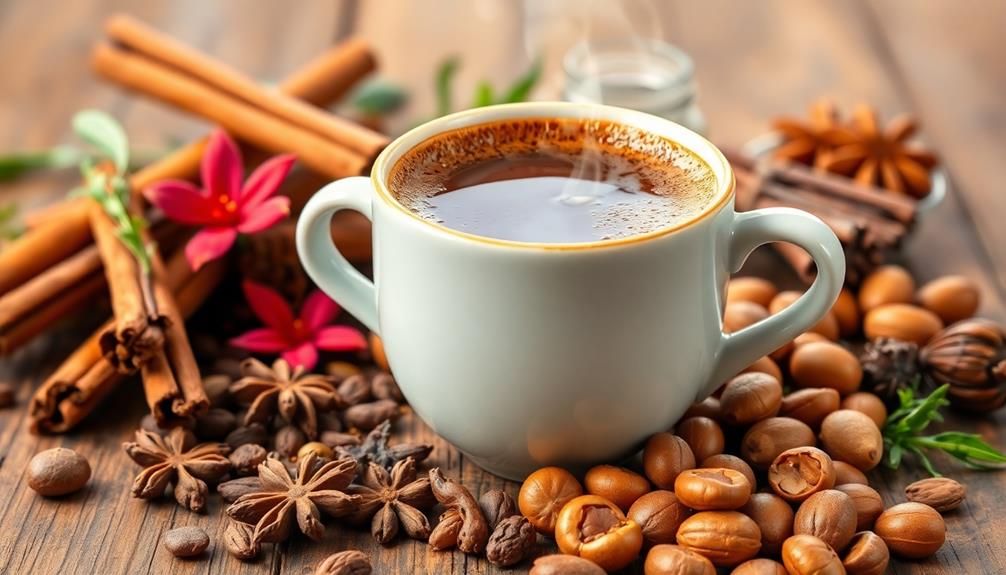
As you explore caffeine-free alternatives to coffee, you'll discover a variety of flavor profiles that can satisfy your palate. Many individuals are turning to these options due to the negative effects of coffee on sleep, as coffee's impact on sleep can disrupt rest and quality.
Chicory root stands out with its nutty, non-bitter taste. It's not only a delightful substitute but also supports digestion thanks to its prebiotic fiber, inulin. If you prefer something with a bit of bitterness, dandelion root mimics coffee's robust flavor while aiding bile production and boosting your immune system.
For a different experience, try MUD\WTR, which combines adaptogenic mushrooms with a spice-forward flavor profile, offering an earthy and comforting drink that still feels rich.
If you're in the mood for something sweeter, the Golde Cacao Turmeric Latte Blend blends cacao with spices, resulting in a versatile flavor that works both hot or cold.
Another tempting option is the Four Sigmatic Mushroom Cacao Mix, which delivers a rich, chocolatey taste enhanced by reishi mushroom, perfect for those who crave a dessert-like beverage without caffeine.
These caffeine-free alternatives provide exciting flavors, ensuring there's something for everyone in this growing market.
How to Transition Smoothly

Shifting from coffee to a caffeine-free alternative can feel intimidating, but it doesn't have to be. With a few simple steps, you can make a smooth change while still enjoying your daily ritual. Here's how:
- Gradually Reduce Coffee: Start by replacing one cup of coffee with black tea. Once you're comfortable, switch to green tea, and finally, move to caffeine-free options. This gradual approach minimizes withdrawal symptoms.
- Incorporate Warm Alternatives: During your morning routine, enjoy warm herbal teas or adaptogenic blends. They provide that cozy feeling you crave while being caffeine-free.
- Explore Flavorful Substitutes: Try products like Rasa Original or Teeccino Dandelion Herbal Tea. These options have a pleasant aroma and mimic the taste profile of traditional coffee without the caffeine.
- Stay Hydrated: Be mindful of mild headaches during your change. Staying hydrated and using herbal teas can help alleviate these symptoms, making your shift smoother.
Recipes for Caffeine-Free Beverages
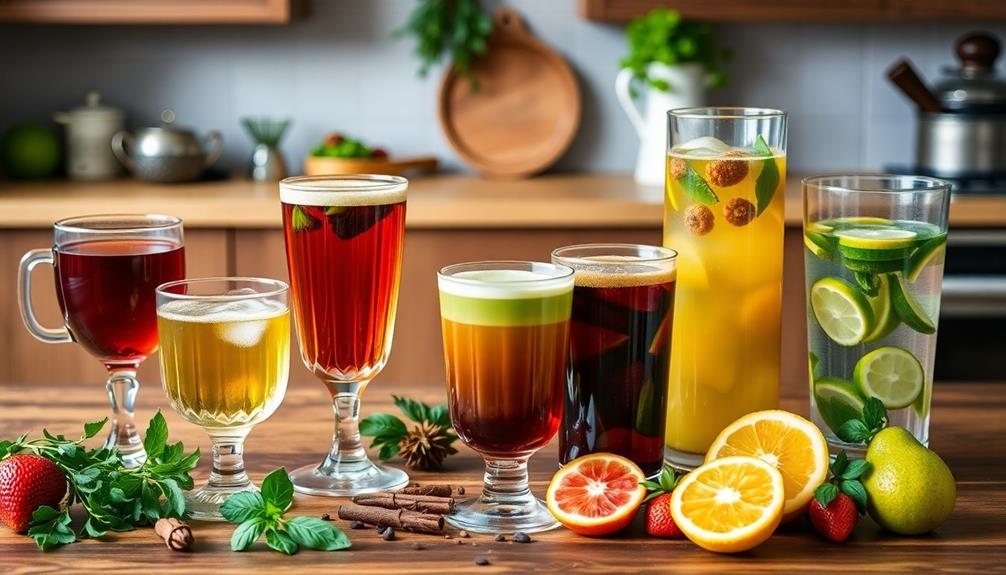
If you're looking for delicious caffeine-free options to replace your morning coffee, there are plenty of recipes that can satisfy your cravings. Here are some enticing caffeine-free alternatives to reflect on:
| Beverage | Ingredients |
|---|---|
| Turmeric Latte | Turmeric powder, black pepper, cinnamon, milk |
| Dandelion Root Tea | Roasted dandelion roots |
| Chicory Coffee | Roasted chicory root |
| Mushroom Cacao Mix | Cacao powder, reishi/lion's mane, hot water |
| Carob Drink | Roasted carob powder, hot water, sweetener |
Try a Turmeric Latte for a warming, anti-inflammatory drink. For a rich, coffee-like flavor, brew Dandelion Root Tea, which also supports liver health. If you crave a nutty taste, Chicory Coffee is perfect, offering digestive benefits. Combine cacao with mushrooms for a Mushroom Cacao Mix that enhances wellness and calms without caffeine jitters. Finally, a Carob Drink serves as a naturally sweet alternative, satisfying your chocolate cravings. Each of these recipes provides a unique twist on your favorite coffee experience without the caffeine!
Community Support and Insights

Many people find comfort and motivation in community support when shifting to caffeine-free alternatives. By connecting with others who share similar experiences, you can navigate the journey more easily.
Here are some insights from the community:
- Personal Experiences: Members share stories about how herbal teas and adaptogenic blends helped them reduce caffeine cravings and manage withdrawal symptoms.
- Support Groups: Many recommend joining programs like the 4 Weeks to Wellness Program for guidance and recipes to detox from caffeine effectively.
- Shared Favorites: Discussing favorite caffeine-free drinks fosters a supportive environment, encouraging everyone to explore unique flavors and enjoy new beverage options together.
- Health Benefits: Participants often talk about positive changes after quitting coffee, such as improved sleep and reduced anxiety, reinforcing the benefits of making this switch.
These interactions create a positive reinforcement cycle, helping you adjust your expectations and embrace the unique flavors and health benefits of caffeine-free alternatives.
With the right community support, you'll find encouragement and motivation on your path to a caffeine-free lifestyle.
Final Thoughts on Coffee Alternatives

As you explore caffeine-free alternatives, it's clear that the landscape of coffee substitutes is both diverse and appealing. Many options mimic the rich flavors of coffee while offering health benefits, such as improved digestion and reduced acidity. You might find yourself drawn to products like MUD\WTR and Rasa Original, which combine adaptogenic herbs and mushrooms, creating flavorful beverages without the jitters typically associated with caffeine in general.
Here's a quick comparison of some popular caffeine-free substitutes:
| Coffee Alternative | Health Benefits |
|---|---|
| Chicory | Improves digestion, reduces acidity |
| Roasted Barley | Nutrient-rich, aids in digestion |
| Dandelion Root | Supports liver health, diuretic |
| Turmeric | Anti-inflammatory properties |
| Adaptogenic Blends | Reduces stress, balances hormones |
Switching to caffeine-free substitutes could lead to fewer anxiety symptoms and better sleep quality. With growing concerns over caffeine's effects, especially for women, these alternatives offer a safer, flavorful path to enhancing wellness. Embracing coffee-like beverages without caffeine allows you to enjoy your daily ritual while prioritizing health.
Frequently Asked Questions
What Drink Tastes Like Coffee but Has No Caffeine?
You can try chicory root, dandelion root, or roasted barley for a coffee-like taste without caffeine. MUD/WTR and Teecino also offer delicious herbal blends that mimic coffee flavors, providing rich alternatives without the jitters.
What Is an Alternative to Caffeine?
If you're seeking an alternative to caffeine, consider options like herbal blends, chicory root, or mushroom-infused drinks. These provide rich flavors and potential health benefits without the jittery side effects of traditional caffeinated beverages.
What to Drink Instead of Coffee to Stay Awake?
Imagine a wise owl, alert and calm. Instead of coffee, try a soothing cup of Rasa or Teeccino. They'll keep you awake without the jitters, letting your mind soar while your body stays grounded.
What Supplements Are Good to Replace Caffeine?
If you're looking to replace caffeine, consider adaptogenic mushrooms like Chaga and Reishi, L-theanine from green tea, Rhodiola rosea, Ashwagandha for stress relief, and B vitamins to support your energy levels throughout the day.
Conclusion
So, who would've thought that ditching caffeine could actually be the buzz of the town? As you embrace this caffeine-free journey, you might find yourself feeling more energized than ever—ironically, without that familiar jolt. With a world of flavorful alternatives and supportive communities at your fingertips, going caffeine-free might just be the best decision you never saw coming. Cheers to your newfound calm, where the only thing brewing is your creativity, not your anxiety!
In the vast and diverse world of coffee, coffee alternatives, and tea, Olivia has found her calling. As an author and a dedicated coffee and tea aficionado, her work for Cappuccino Oracle reflects her profound love and understanding of the intricate complexities found within these beverages. Olivia’s passion for the subject serves as both a catalyst for her creativity and a connection point with her audience.
Olivia’s appreciation for coffee, coffee alternatives, and tea blossomed at an early age. She discovered that these beverages invigorated her senses and stimulated her creative spirit. From the nuanced flavors of single-origin roasts to the captivating narratives intertwined with coffee, coffee alternatives, and tea trade and culture, Olivia found an unlimited source of inspiration in her daily cup.
Her love for these beverages and her talent for storytelling eventually converged at Cappuccino Oracle. As an author, Olivia’s mission is to illuminate the intricate tapestry that makes up the world of coffee, coffee alternatives, and tea. Her articles span a diverse range of topics, encompassing everything from the unique flavors of different brews to the sociocultural history intertwined with their cultivation and consumption.
Coffee Alternatives And Tea
The $2 Supermarket Item That’s Better Than Any Energy Drink
Unlock the secret to hydration with a $2 supermarket item that outperforms energy drinks—discover how coconut water can revolutionize your energy levels!

If you're looking for a $2 supermarket item that's better than any energy drink, grab coconut water. It hydrates you while providing essential electrolytes, making it a fantastic alternative to sugary energy drinks. With only 6 grams of natural sugar per cup and about 600 mg of potassium, it supports muscle function and helps prevent cramps. Plus, it's low in calories, unlike the typical energy drink loaded with sugar and caffeine. You'll feel energized without the jitters or crashes. Stick with coconut water for a healthier boost, and there's more to explore about energizing alternatives that can transform your routine.
Key Takeaways
- Coconut water, costing around $2, offers natural electrolytes and hydration without the excessive sugar found in energy drinks.
- Matcha green tea provides sustained energy with less caffeine and no sugar, making it a healthier alternative at about $1 per serving.
- Fresh juices, like orange juice, deliver high vitamin content and antioxidants, supporting overall health for $1 to $2.
- Herbal teas, available for around $1 per bag, provide caffeine-free energy and various health benefits without the risks of energy drinks.
- Smoothies can be homemade for $2 to $3, combining nutrient-rich ingredients for a boost without the sugar overload of energy drinks.
Overview of Energy Drinks

Energy drinks have surged in popularity, generating nearly $20 billion in the US market in 2023. These beverages promise a quick boost of energy, often marketed as a way to enhance both physical and mental performance.
Popular energy drinks like Red Bull and Monster pack a hefty punch, but they also come with significant health concerns. For instance, Red Bull contains 27g of sugar per serving, while Monster has 54g, which exceeds the daily recommended intake for adults.
Additionally, the use of cookies to enhance browsing experience is a reminder that what we consume, whether it be food or beverages, can have lasting effects on our health.
When it comes to caffeine content, there's a wide range. Brands like Bang Energy can deliver up to 300 mg of caffeine in a 16 oz can, whereas others like Aspire Healthy Energy offer just 80 mg per 12 oz.
While some swear by these drinks for a quick energy fix, studies indicate mixed results compared to traditional energy sources like coffee.
Moreover, the high sugar and caffeine content raises alarms about potential health risks, including heart issues, increased anxiety, and sleep disturbances.
Benefits of Coconut Water

Coconut water stands out as a natural hydration source packed with essential electrolytes like potassium and magnesium.
Its anti-inflammatory properties make it even more beneficial for recovery after intense workouts. When you choose it over sugary energy drinks, you're not just cutting calories; you're also supporting your muscle function and overall recovery.
It's a revitalizing, nutrient-rich option that keeps you energized without the crash.
Juice diets may lead to nutrient deficiencies if not balanced, making coconut water a smart alternative.
Natural Hydration Source
When you're looking for a rejuvenating way to stay hydrated, coconut water stands out as a fantastic choice. This natural hydration source is packed with electrolytes like potassium, sodium, and magnesium, making it a healthier alternative to sugary energy drinks. It's low in calories—about 60 per serving—and fat-free, providing a revitalizing option without the artificial ingredients found in many commercial beverages.
Here's a quick comparison of coconut water and typical energy drinks:
| Feature | Coconut Water | Energy Drinks |
|---|---|---|
| Calories | 60 | 100+ |
| Natural Sugars | 15g | 20g+ |
| Electrolytes | High | Variable |
| Antioxidants | Yes | No |
| Muscle Function Support | Yes | Limited |
Coconut water not only helps replenish lost fluids but also enhances exercise performance, supporting proper muscle function and reducing cramping. Plus, it's rich in antioxidants, which combat oxidative stress and aid in recovery post-exercise. Choosing coconut water means you get hydration without the jitters or crashes associated with high-caffeine energy drinks.
Nutrient-Rich Electrolyte Balance
Staying hydrated is vital for your overall well-being, especially during physical activities. Coconut water stands out as a nutrient-rich option that helps maintain your electrolyte balance. With about 600 mg of potassium per cup, it supports ideal hydration and muscle function, making it perfect for workouts.
It's low in calories, too, at only 46 calories per cup. This means you can enjoy its invigorating taste without worrying about excess calories or added sugars found in sugary energy drinks. Additionally, consuming coconut water may assist in digestive health and gut function, adding to its appeal as a natural drink choice for health-conscious individuals beneficial for overall health.
Coconut water isn't just hydrating; it's also rich in antioxidants, which help reduce oxidative stress and inflammation in your body. This is essential for recovery after exercise. You'll find about 6 grams of natural sugar in each cup, providing a quick energy boost while keeping sugar levels lower than many commercial options.
The presence of electrolytes like sodium and magnesium enhances its hydrating properties, making coconut water perfect for replenishing fluids lost during intense workouts or hot weather.
Advantages of Matcha Green Tea

Discovering the advantages of matcha green tea can transform your approach to energy and wellness. This vibrant green powder isn't just a trendy drink; it's packed with health benefits that can elevate your daily routine.
Rich in antioxidants, particularly catechins, matcha supports overall health and wellness, making it a fantastic choice for those looking to improve their liveliness unique qualities of different teas.
Here are three compelling reasons to incorporate matcha into your life:
- Sustained Energy: With about 70 mg of caffeine per 8-ounce serving, matcha green tea offers a more stable energy boost without the spike and crash typical of energy drinks.
- Cognitive Enhancement: The L-theanine in matcha helps improve focus and cognitive function, making it perfect for studying or intense work sessions.
- Antioxidant Power: Matcha is rich in antioxidants, particularly catechins, which help combat oxidative stress and promote overall health.
Not only is matcha low in calories, but it's also a healthy alternative to sugary energy drinks.
You'll enjoy energy levels that last without the added sugars, all while supporting your wellness journey.
Nutritional Comparison

When you compare the nutritional content of coconut water and green tea to energy drinks, you'll notice some striking differences.
Coconut water provides hydration and electrolytes with fewer calories and sugar, while green tea offers a moderate caffeine boost without the jitters.
Additionally, incorporating chia seeds into your diet can further enhance your energy levels due to their high fiber content and ability to promote satiety.
Plus, both options are packed with vitamins and antioxidants, giving you a healthier energy source overall.
Nutritional Content Overview
While energy drinks may promise a quick boost, their nutritional content often falls short compared to healthier alternatives. Herbal teas, for instance, provide hydration and may offer various health benefits, such as aiding digestion and promoting relaxation, making them an excellent choice for those seeking a natural energy lift.
Here's a quick comparison:
- Sugar Content: Energy drinks like Red Bull contain 27g of sugar per 8.4-ounce can, surpassing the recommended daily intake for women and nearing the limit for men. In contrast, coconut water has just 6g of natural sugar per 8-ounce serving.
- Calories: A 12-ounce can of Rockstar packs about 200 calories, while a nutrient-dense smoothie can provide essential vitamins and minerals with fewer calories.
- Antioxidants: Energy drinks focus mainly on caffeine, ranging from 80mg to 300mg per serving, while alternatives like matcha or green tea offer a moderate caffeine content (30-70mg) along with beneficial antioxidants.
Additionally, herbal teas contain antioxidants, which help combat oxidative stress and improve overall health, making them a great choice for a rejuvenating beverage with unique flavors and benefits.
Choosing these healthy alternatives not only reduces your sugar and calorie intake but also boosts your nutritional value.
You'll find that fresh juices, smoothies, and coconut water deliver hydration and essential vitamins and minerals, which energy drinks often lack.
Caffeine vs. Natural Energy
Evaluating the differences between caffeine from energy drinks and natural sources reveals significant advantages in choosing the latter. While energy drinks can pack as much as 300 mg of caffeine and high sugar levels, natural energy sources like green tea offer a gentler boost of 30-50 mg without the jitters.
Here's a quick comparison:
| Source | Caffeine Content | Sugar Content |
|---|---|---|
| Energy Drinks | Up to 300 mg | 27 g per can |
| Green Tea | 30-50 mg | 0 g |
| Coconut Water | 0 mg | 0 g |
Natural energy sources, such as yerba mate and matcha, provide not just caffeine but also antioxidants, promoting overall health. Unlike synthetic ingredients in energy drinks that can lead to adverse effects like increased heart rate and anxiety, herbal teas offer a more balanced energy release. Plus, natural options like fresh juices and smoothies use whole food ingredients that enhance nutrient absorption. By choosing natural energy, you're opting for health benefits without the crash that often comes with processed energy drinks.
Vitamins and Antioxidants Benefits
Fresh juices and smoothies are packed with vitamins and antioxidants that offer numerous health benefits, making them a fantastic alternative to energy drinks.
For example, unique combinations like mango, coconut water, and lime can provide invigorating tropical flavors while boosting hydration.
Here are three reasons why you should consider them:
- Nutrient Density: Fresh juices, like orange juice, can provide you with over 100% of your daily vitamin C, essential for immune function and skin health.
- Chronic Disease Prevention: Antioxidants in these beverages combat oxidative stress, potentially lowering your risk of chronic diseases such as heart disease and cancer.
- Hydration and Electrolytes: Coconut water delivers natural electrolytes like potassium and magnesium, essential for hydration and muscle function, without the high sugar content found in many energy drinks.
Cost-Effectiveness of Alternatives

When it comes to finding cost-effective alternatives to energy drinks, several supermarket items stand out as budget-friendly options. You can easily swap out those pricey energy drinks, typically ranging from $2 to $4 per can, for healthier alternatives that won't break the bank.
For instance, a cup of green tea offers a gentle caffeine boost for about $1, while fresh juices can be made at home for just $1 to $2, providing nutrients without the high sugar content. Additionally, green tea – the elixir of longevity is rich in antioxidants that can improve skin health, making it a dual-purpose drink for both energy and beauty.
If you're looking for a more relaxing beverage, herbal teas are often available for around $1 per bag, offering a caffeine-free option that hydrates and calms. You can also create smoothies with fruits and vegetables for about $2 to $3, providing a customizable energy boost packed with vitamins and minerals.
Lastly, sparkling water with citrus is an excellent choice, costing less than $1 when made at home. It's invigorating and hydrating, steering clear of the added sugars and high calories found in most energy drinks.
Health Risks of Energy Drinks

Energy drinks can pack a punch, but that boost often comes with hidden health risks that shouldn't be ignored. Here are three major concerns you should consider:
- High Caffeine Content: Some energy drinks contain up to 300mg of caffeine per serving, far exceeding the FDA's recommended limit of 400mg per day. This can lead to severe health implications, especially for those with pre-existing conditions, emphasizing the importance of end of life importance of planning ahead for your health.
- Excess Sugar Levels: Brands like Red Bull and Monster can have up to 54g of sugar, surpassing the American Heart Association's daily limits for men and women.
- Potential Side Effects: Many users report headaches, dizziness, and restlessness, making the initial energy boost often followed by an afternoon crash.
These factors contribute to serious health risks, including increased blood pressure, heart complications, and heightened anxiety.
The combination of high sugar and caffeine raises concerns about addiction potential and metabolic imbalances. If you're sensitive to caffeine, the side effects can be even more pronounced, leading to insomnia and digestive issues.
Ultimately, while you might crave that quick energy boost, the long-term consequences of consuming energy drinks could outweigh the benefits.
Tips for Transitioning to Alternatives

Shifting away from energy drinks doesn't have to be overwhelming; in fact, small, manageable changes can make a significant difference. Start by gradually reducing your intake of popular energy-drink brands. For instance, substitute one energy drink per day with healthier options like green teas or coconut water. This will ease your adjustment and minimize withdrawal symptoms.
Incorporate nutrient-dense snacks such as nuts and Greek yogurt to maintain energy without the sugar crashes associated with energy drinks. Staying hydrated is essential; aim for at least 8 cups of water daily. Dehydration can lead to fatigue, so keep water or herbal teas close by.
Consider integrating regular physical activity into your routine. Exercise naturally boosts energy levels and helps reduce reliance on energy drinks. You might also enjoy experimenting with homemade smoothies, which can provide essential vitamins and minerals.
Here's a table to help you visualize some alternatives:
| Alternative | Possible Benefits | Tips for Use |
|---|---|---|
| Green Tea | Antioxidants, mild caffeine boost | Drink in the morning |
| Coconut Water | Hydration, electrolytes | Use as a post-workout drink |
| Nuts | Sustained energy, healthy fats | Snack between meals |
| Greek Yogurt | Protein-rich, keeps you full | Add fruits for flavor |
| Smoothies | Nutrient-packed, versatile | Blend fruits and greens |
Frequently Asked Questions
What Is a Better Option Than Energy Drinks?
If you're looking for a better option than energy drinks, try green tea or coconut water. They provide natural energy without the jitters, keeping you hydrated and refreshed, while offering essential nutrients your body craves.
What Is the Number 2 Energy Drink?
So you think you need a rocket-fuel energy drink? Well, the number 2 energy drink in the U.S. is Monster Energy. It's got caffeine and sugar galore, perfect for your high-octane lifestyle!
What Is the Number 1 Energy Drink?
You might be surprised to learn that the number one energy drink is Red Bull. With its strong caffeine content and marketing strategies, it leads the market, generating billions in revenue and dominating the competition.
What Is the Healthiest Energy Drink Brand?
When considering the healthiest energy drink brand, you might want to try Guayaki Yerba Mate. It offers organic ingredients, antioxidants, and a moderate caffeine boost, making it a great choice for your energy needs.
Conclusion
By choosing alternatives like coconut water or matcha green tea, you're not just saving money but also boosting your health. Imagine swapping your daily energy drink for a rejuvenating coconut water instead. You'd hydrate, replenish electrolytes, and avoid the jitters. After a week, you might find you have more consistent energy levels throughout the day, just like Sarah did when she ditched her energy drinks for matcha. It's time to make the smarter choice for your body and wallet!
In the vast and diverse world of coffee, coffee alternatives, and tea, Olivia has found her calling. As an author and a dedicated coffee and tea aficionado, her work for Cappuccino Oracle reflects her profound love and understanding of the intricate complexities found within these beverages. Olivia’s passion for the subject serves as both a catalyst for her creativity and a connection point with her audience.
Olivia’s appreciation for coffee, coffee alternatives, and tea blossomed at an early age. She discovered that these beverages invigorated her senses and stimulated her creative spirit. From the nuanced flavors of single-origin roasts to the captivating narratives intertwined with coffee, coffee alternatives, and tea trade and culture, Olivia found an unlimited source of inspiration in her daily cup.
Her love for these beverages and her talent for storytelling eventually converged at Cappuccino Oracle. As an author, Olivia’s mission is to illuminate the intricate tapestry that makes up the world of coffee, coffee alternatives, and tea. Her articles span a diverse range of topics, encompassing everything from the unique flavors of different brews to the sociocultural history intertwined with their cultivation and consumption.
Coffee Alternatives And Tea
You’ve Been Brewing Tea Wrong Your Whole Life
Optimize your tea brewing techniques to unlock hidden flavors; discover the surprising factors that could transform your daily cup into a delightful experience.

You've been brewing tea wrong, and it's time to change that. First, consider using loose leaf tea instead of cheap tea bags for a richer flavor. Steep black tea for four to five minutes to maximize its benefits. Your brewing vessel matters too; a porcelain teapot retains heat better. Using filtered water enhances the taste, while mug color can influence how sweet your tea tastes. Finally, experiment with additives like milk, lemon, or spices to elevate your experience. If you want to grasp all the nuances of tea brewing, there's much more waiting for you.
Key Takeaways
- Always use whole leaf tea instead of tea bags for a richer flavor and aroma experience.
- Steep black tea for four to five minutes to fully extract optimal flavor and health benefits.
- Use filtered water to enhance taste and avoid hard minerals that can alter flavor profiles.
- Choose a porcelain teapot for better heat retention, crucial for effective loose leaf tea brewing.
- Add milk, sugar, or spices after steeping to enhance flavor without overpowering the tea's natural taste.
Importance of Quality Ingredients
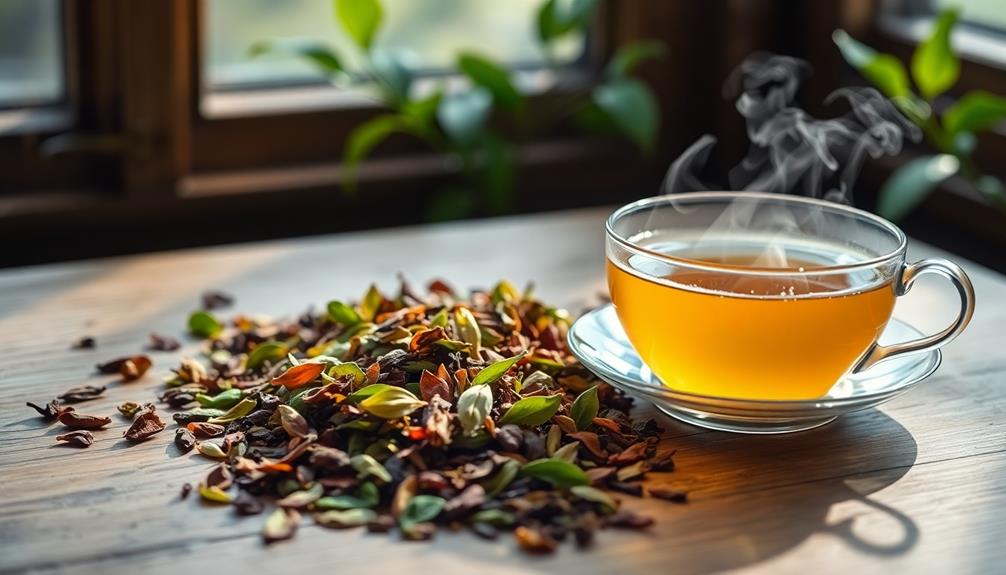
When it comes to brewing the perfect cup of tea, the quality of your ingredients can make all the difference. While 96% of tea drinkers rely on tea bags, you might want to take into account loose leaf tea for its superior flavor and aroma. Whole leaves retain essential oils that enhance the taste, giving you a richer experience.
Brands like Yorkshire Tea stress the significance of using quality ingredients and proper brewing techniques to elevate your tea. Additionally, the environment where you brew can impact your tea's quality; for instance, guaranteeing clean and well-maintained equipment can prevent contamination and enhance flavor, similar to how air purifiers need regular maintenance.
Water quality is equally crucial. Using filtered water instead of tap water can dramatically improve your tea's taste by removing hard minerals that create scum and alter flavor profiles. The right type of water will guarantee that the flavors of your tea bags or loose leaf tea shine through.
Don't underestimate the impact of your mug either! Studies show that the color of your mug can influence your perception of sweetness, adding another layer to your tea experience.
The Art of Steeping Tea

Steeping tea is an essential step in crafting a flavorful cup, and getting it right can transform your experience. For most black teas, like Yorkshire Tea, aim for a steeping time of four to five minutes. This window allows for maximum flavor extraction without introducing bitterness. If you steep longer, you might notice an increase in caffeine and antioxidants, with levels rising from about 35 mg to 50 mg.
Additionally, herbal teas, particularly those with ingredients like turmeric and ginger, can offer health benefits for fibromyalgia while you enjoy your brew.
Proper steeping greatly influences taste. If you don't steep long enough, you'll end up with a bland cup that tastes more like hot water than the rich flavor you crave. It's also important to reflect on your water quality. Using filtered water can markedly enhance your tea's flavor by minimizing the negative effects of hard water, which can create scum and interfere with flavor compounds.
After steeping, you can personalize your experience by gently squeezing the tea bag, helping to release more flavor. Just be cautious—too much squeezing can lead to bitterness.
Mastering the art of steeping not only elevates your tea-drinking experience but also maximizes its health benefits, making each cup a delightful ritual.
Choosing the Right Vessel
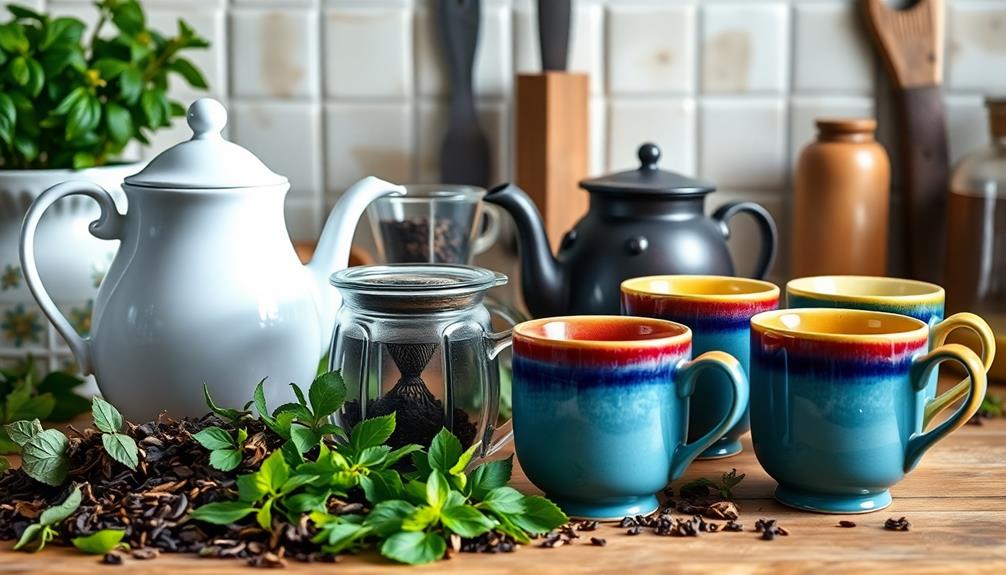
Selecting the right vessel for your tea can greatly enhance your drinking experience. Using a porcelain teapot is a fantastic choice for brewing loose leaf tea, as it retains heat better than other materials, ensuring ideal steeping. This heat retention is essential for flavor extraction, allowing your tea to reach its full potential.
Additionally, the right vessel can help maintain air quality, which is important since certain materials can impact how flavors are perceived. For instance, air quality considerations can improve your overall tea enjoyment by reducing unwanted odors.
On the other hand, be cautious with your mugs. Research shows that the color and material can impact your perception of flavor. For instance, red mugs can enhance the perception of sweetness, while Styrofoam cups can negatively affect flavor absorption. Their insulating properties can lead to a less enjoyable tea experience, so it's best to avoid them.
Furthermore, the material of your drinking vessel influences thermal properties, which play a significant role in how your tea brews. Using a poor-quality vessel can hinder the steeping process, ultimately affecting the flavor you savor.
Enhancing Flavor With Additives
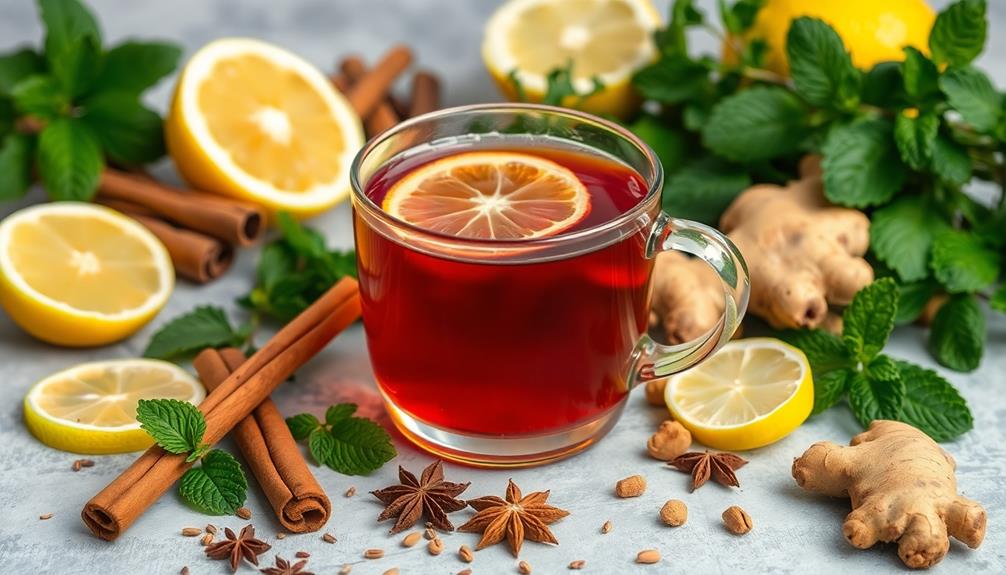
Elevate your tea experience by exploring various additives that can enhance flavor and create a more enjoyable brew. Many of us have been making tea wrong by overlooking these simple yet effective ingredients.
For instance, adding a splash of milk can introduce creaminess and balance out the tannins in your cup, but remember to add it after steeping to prevent scalding the tea. Additionally, consider pairing your tea with a cleaner indoor environment; using an air purifier can greatly improve your overall well-being while enjoying your beverage, as it helps reduce allergens and enhances air quality air quality benefits.
If you prefer a touch of sweetness, consider a teaspoon of sugar or honey. Just be cautious—not to overpower the delicate flavors of the tea.
Lemon is another popular additive; it adds a zesty flavor while boosting vitamin C, making your tea more invigorating.
Don't stop there—experiment with spices like cinnamon or cardamom, which can introduce unique flavor profiles, especially in black teas. This not only enriches the overall experience but also makes your cup truly your own.
Lastly, gently squeeze the teabag after steeping to intensify the flavor, but don't overdo it; this can lead to bitterness.
With these additives, you'll transform your tea-drinking ritual and never look back!
Unlocking Health Benefits of Tea
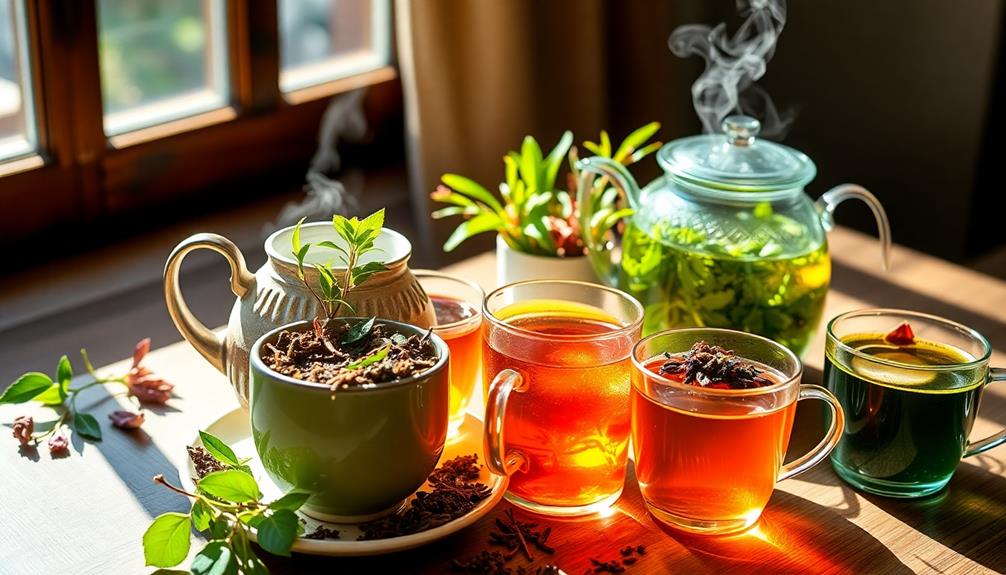
Enhancing your tea's flavor with additives is just the beginning; the way you brew it can reveal a treasure trove of health benefits. To truly access these benefits, aim to steep your tea for five minutes. This duration markedly boosts antioxidant levels, which can aid in disease prevention and overall wellness, particularly with varieties like oolong tea, known for its rich polyphenols and health-promoting properties its unique flavor profile.
Here are three top tips for maximizing those health benefits:
First, always use filtered water. The quality of water impacts flavor and extraction of beneficial compounds.
Second, be mindful of the amount of caffeine. While a longer brew time increases caffeine content, it can also enhance alertness and focus.
Frequently Asked Questions
Can I Reuse Loose Leaf Tea for Multiple Brews?
Yes, you can definitely reuse loose leaf tea for multiple brews! Just remember to adjust the steeping time and temperature for each infusion, as flavors will vary with each subsequent brew. Enjoy your tea!
How Do I Properly Store Loose Leaf Tea?
Storing loose leaf tea is like tucking away a treasure. Keep it in an airtight container, away from light and moisture. You'll preserve its flavor and freshness, ensuring every brew delights your senses anew.
What Is the Best Water Temperature for Different Tea Types?
For ideal flavor, steep black tea at 200°F, green tea at 175°F, oolong at 190°F, and white tea around 160°F. Adjusting water temperature enhances your brewing experience and brings out each tea's unique qualities.
Are There Specific Teas That Are Better for Morning Versus Evening?
Certain teas suit different times. In the morning, opt for energizing black or green teas. For evening, choose calming herbal blends like chamomile or peppermint, which help you relax and prepare for restful sleep.
How Can I Tell if My Tea Has Expired?
You might wonder if your tea's still good. Check for an off smell, faded color, or unusual texture. If it's lost its aroma or flavor, it's time to say goodbye and replace it.
Conclusion
In the garden of tea, you've tended to weeds instead of nurturing the blossoms. By embracing quality ingredients and mastering the steeping process, you're cultivating a richer experience. Choosing the right vessel is like selecting the perfect sun for your blooms. As you sprinkle in flavors and uncover health benefits, you're painting a vibrant landscape of well-being. So, let your brewing journey flourish—each cup is a step toward the lush paradise of true tea appreciation.
In the vast and diverse world of coffee, coffee alternatives, and tea, Olivia has found her calling. As an author and a dedicated coffee and tea aficionado, her work for Cappuccino Oracle reflects her profound love and understanding of the intricate complexities found within these beverages. Olivia’s passion for the subject serves as both a catalyst for her creativity and a connection point with her audience.
Olivia’s appreciation for coffee, coffee alternatives, and tea blossomed at an early age. She discovered that these beverages invigorated her senses and stimulated her creative spirit. From the nuanced flavors of single-origin roasts to the captivating narratives intertwined with coffee, coffee alternatives, and tea trade and culture, Olivia found an unlimited source of inspiration in her daily cup.
Her love for these beverages and her talent for storytelling eventually converged at Cappuccino Oracle. As an author, Olivia’s mission is to illuminate the intricate tapestry that makes up the world of coffee, coffee alternatives, and tea. Her articles span a diverse range of topics, encompassing everything from the unique flavors of different brews to the sociocultural history intertwined with their cultivation and consumption.
-

 Coffee Basics2 weeks ago
Coffee Basics2 weeks ago10 Potential Health Risks of Single-Serve Coffee Pods and How to Mitigate Them
-

 Coffee Basics2 weeks ago
Coffee Basics2 weeks agoCaffeine Content Comparison: Nespresso Vs. Traditional Coffee Vs. Energy Drinks
-

 Coffee Basics2 weeks ago
Coffee Basics2 weeks agoCelebrity Coffee Habits: Insights From TV and Movie Stars
-

 Coffee Basics1 week ago
Coffee Basics1 week agoThe Impact of Coffee on Digestive Health: What Science Says
-

 Coffee Basics1 week ago
Coffee Basics1 week agoYerba Mate: The South American Superfood and Its Health Benefits
-

 Coffee Basics2 weeks ago
Coffee Basics2 weeks agoSoft Drinks and Medical Tests: What You Need to Know
-

 Coffee Basics1 week ago
Coffee Basics1 week agoHerbal Teas for Every Occasion: From Relaxation to Romance
-

 Coffee Basics2 weeks ago
Coffee Basics2 weeks agoMaximizing the Shelf Life of Your Matcha: Storage Tips and Tricks































